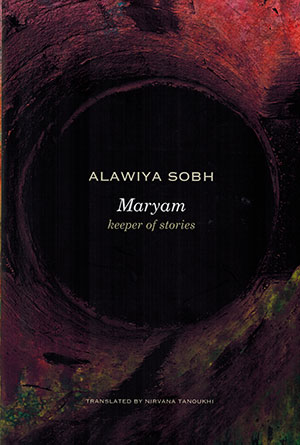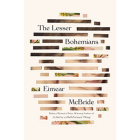Maryam: Keeper of Stories by Alawiya Sobh
 Chicago. Seagull Books (University of Chicago Press, distr.). 2016. 265 pages.
Chicago. Seagull Books (University of Chicago Press, distr.). 2016. 265 pages.
Maryam: Keeper of Stories is a novel depicting women’s experiences during the Lebanese civil war across class, sect, and generation. It raises complex questions of memory and identity and contains beautiful observations of the essence of conflict and violence and people’s struggles with the cruelties of politics and of one another. In this novel, memories are in danger of erasure as the narrator, Maryam, struggles to rescue them: “All smells disappear, following those who create them. But the scent of memories remains, and disappears only with the flight of its author. I recount these memories so the scent will stay right here.” The novel is finely rendered, nostalgic, and resilient. Maryam makes no excuse for her “dream” to leave Lebanon and, once abroad, her desire to return. She remembers her friends and recounts their experiences together during the war. There is no anger articulated, only acceptance and sadness, no matter the scale.
Alawiya Sobh is an author of remarkable skill and range. She elegantly strings together a love for writing and incisive observations of society’s restrictions on women. The stories told inside this novel traverse an equally diverse range of topics from love, female friendship, loss, and survival. Sobh’s language effortlessly delivers and engages the reader in the varied emotions carried by these topics as it billows and patters and spirals just like the country she describes. Sobh creates a snapshot of the Lebanese civil war and of the world at the time, as seen through the eyes of women. The focus here is not on plot or on characters; memories, place, and time are what is at stake: “The war silenced me, I invented Maryam to tell the story for me.” These recounted memories provide emotional resonance as the novel plumbs the depths of human experience and interrogates our beliefs and faiths.
Nirvana Tanoukhi has translated the Arabic novel into an equally gentle read in English. The skilled translation enables the reader to slip into the stories easily, and the close observations and simple directness are very hospitable. This daring, vibrant, and colorful work engages the viewer intellectually as well as emotionally with each chapter, and Tanoukhi’s bravery in choosing to undertake this beautiful and delicate work of Arabic literature will forever be admired and appreciated.
Nicole Fares
University of Arkansas
Get the book on Amazon or add it to your Goodreads reading list
More Reviews
-
-
-
-
-
-
-
-
-
-
-
-
-
-
-
-
-
-
Umami by Laia Jufresa
Laia Jufresa. Trans. Sophie Hughes -
-
-
-
-
-
-
-
-
-
Eva Sleeps by Francesca Melandri
Francesca Melandri. Trans. Katherine Gregor -
-
-
-
-
-





































